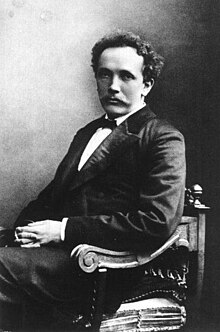Guntram (opera)

Guntram (Op. 25) is an opera in three acts by Richard Strauss with a German libretto written by the composer. The second act of the opera was composed in Ramacca, Sicily.[1]
It was Strauss' first opera and shows a strong Wagnerian influence. The music of Guntram is quoted in Strauss's tone poem Ein Heldenleben. The composer revised the score in 1940.
Performance history
The opera was not very successful, and was only staged a few times during Strauss' lifetime:
The first performance took place on 10 May 1894 at the Grossherzogliches Hoftheater in Weimar. The soprano role of Freihild was sung by Pauline de Ahna, Strauss's future wife. Later performances conducted by Strauss included those in Munich on 16 November 1895 and in Prague on 9 October 1901. A performance in Frankfurt was given on 9 March 1910 conducted by Ludwig Rottenberg.
The revised version was first given in Weimar on 29 October 1940, conducted by Paul Sixt, and later in 1942 in Berlin conducted by Robert Heger.
In Hamburg, on 4 February 1895, Gustav Mahler included the prelude to act 1 in his 6th Philharmonic Concert. He included the preludes to acts 1 and 2 in a concert in Vienna on 19 February 1899, and in New York City on 30 March 1910 with the New York Philharmonic.
Roles
| Role | Voice type | Premiere cast, 10 May 1894 Conductor: Richard Strauss |
|---|---|---|
| The old Duke | bass | Karl Bucha |
| Freihild, his daughter | soprano | Pauline de Ahna, then Strauss's fiancée |
| Duke Robert, her husband | baritone | Franz Schwarz |
| Guntram, singer | tenor | Heinrich Zeller |
| Friedhold, singer | bass | Ferdinand Wiedey |
| The Duke's jester | tenor | Hans Gießen |
| An old woman | contralto | Luise Tibelti |
| An old man | tenor | Hr. Lutz |
| Two younger men | basses | Hr. Barth, Hermann Buche |
| Three vassals | basses | Hr. Fischer, Hr. Schustherr, Hr. Henning |
| A messenger | baritone | Hermann Buche |
| Four Minnesingers | tenors, basses | Hr. v. Szpinger, Hr. Knöfler, Hr. Glitsch, Hr. Weyrauch |
| Vassals, Minnesingers, monks, servants, vagrants | ||
Synopsis
Set in medieval Germany, the triangular Wagnerian-style story of love and redemption is about the minstrel Guntram, the evil Duke Robert and his saintly wife Freihild. (The story is not connected with the Merovingian king Guntram of Burgundy.)
Recordings
| Year | Cast: Guntram, Freihild, The Old Duke, Duke Robert, Friedhold |
Conductor, Opera house and orchestra |
Label[2] |
|---|---|---|---|
| 1981 | William Lewis, Carole Farley, Patrick Wheatley, Terence Sharpe, John Tomlinson |
John Pritchard BBC Symphony Orchestra and BBC Singers |
CD: Gala Cat: GL 100787 |
| 1984 | Reiner Goldberg, Ilona Tokody, Sandor Solyom-Nagy, Istvan Gati, Janos Bandi |
Eve Queler Hungarian State Orchestra |
CD: Sony Music Cat: 88697448162 |
| 2005 | Gian Luca Zampieri, Elena Comotti, Andrea Martin, Raphael Sigling, Thomas Gazheli |
Gustav Kuhn Tirol Festival, Erl Orchestra and male chorus (Live recording) |
DVD: Col Legno 80004 |
References
- ^ Antonio Cucuzza, "Wagner a Ramacca?", Agorà XVI (a. V – January–March 2004), pp. 52–53. (In Italian)
- ^ Recordings of Guntram listed on operadis-opera-discography.org.uk
Further reading
- Murray, David (2001). "Guntram". Grove Music Online (8th ed.). Oxford University Press. doi:10.1093/gmo/9781561592630.article.O005142. ISBN 978-1-56159-263-0. (subscription required)
External links
- Casaglia, Gherardo (2005). "Guntram". L'Almanacco di Gherardo Casaglia (in Italian).
- Richard Strauss works, Operone.de
- Guntram: Scores at the International Music Score Library Project
